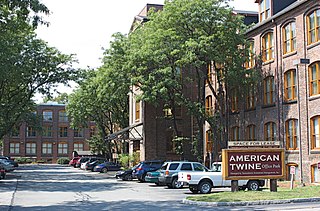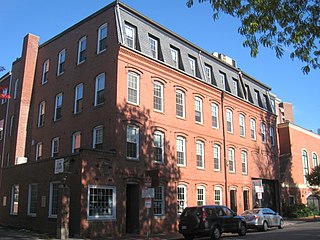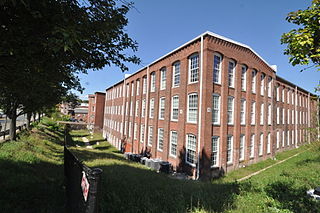
"Wachusett" is a word derived from the Algonquian languages such as Nipmuc and Wompanoag, still spoken by the Native Americans of Massachusetts and is believed to approximate "near the mountain" or "mountain place". Wachusett was originally used as the name of a mountain in Massachusetts; other uses of the word have been derived directly from the name of the mountain.

The Mall at Whitney Field is a shopping mall located off of Route 2 near the junction with Interstate 190 in Leominster, Massachusetts. The mall opened in 1967 and was renovated and renamed in 2004. The mall's anchor stores are Burlington and JCPenney with two vacant anchors last occupied by Macy's and Sears. The mall was previously owned by Walton Street Capital LLC of Chicago until May 2013 when Vintage Real Estate acquired the mall with plans to renovate and turnaround the struggling mall. As of January 8, 2020, the mall is now owned by Hull Property Group.

The American Net and Twine Company Factory is a historic factory at 155 2nd Street in Cambridge, Massachusetts. It was built in 1875 by the nation's first manufacturer of cotton fishing nets. It now houses corporate office space. It was listed on the National Register of Historic Places in 1982.

The Reversible Collar Company Building is a historic factory building at 25–27 Mt. Auburn & 10–14 Arrow Streets in Cambridge, Massachusetts. The building has a complex construction history, consisting of several buildings constructed separately between 1862 and 1907, and gradually combined into a single structure. The oldest portions were built by Allen and Farnham, a printing business. The property was sold to the Reversible Collar Company in 1867, which expanded the facility. The company at first manufactured paper shirt collars, but later also produced paper and paper-fabric combinations for use in products like wall charts and maps. The buildings on the site were sold to the Boston Bookbinding Company in 1897. In the late-1960s the building was converted to office and commercial space.

The Hayward Mill is a historic mill complex at the junction of North and Cook Streets, on the Mumford River in Douglas, Massachusetts. The site, with an industrial history dating to the 18th century, is populated by a series of connected buildings dating to 1880 or later. The mill was the first financial successful textile operation in Douglas, and was operated until the 1960s. The mill complex was listed on the National Register of Historic Places in 1991. It has been converted to residential use.

The Wellington Piano Case Company Building is an historic building at 54 Green Street in Leominster, Massachusetts. The four-story brick building was built in 1895 by Frank E. Wellington, who manufactured piano cases for upright and grand pianos. The building was listed on the National Register of Historic Places in 1984. It was converted to condominium residences in 2002.

The Wachusett Shirt Company is an historic industrial complex at 97-106 Water Street in Leominster, Massachusetts, United States. The five-building complex was developed between 1887 and 1910, and was home to one of the city's leading employers until the 1930s. Most of the complex converted into a residential complex known as Riverway Apartments in 1981. It was listed on the National Register of Historic Places in 1982.

The Heywood-Wakefield Company Complex is a historic factory complex at 206 Central Street in Gardner, Massachusetts. The complex, located at the corner of Central and Elm in West Gardner, has its origins in a chair manufacturing business established in 1826 by the Heywood brothers. The current brick factory buildings date to the later decades of the 19th century. The property was listed on the National Register of Historic Places in 1983.

The F. A. Whitney Carriage Company Complex Historic District encompasses a major 19th-century industrial complex off 124 Water Street in Leominster, Massachusetts. The complex is one of the best-preserved in the city, and was developed by of its most successful businesses of the late 19th and early 20th centuries. The F. A. Whitney Company, founded in 1858, manufactured baby carriages and related products, and operated here from 1862 to 1952, and was one of the city's major employers. The oldest surviving buildings of its manufacturing complex date to 1872. The district was listed on the National Register of Historic Places in 1988. Most of the complex has been converted into residential use.

The Union Street Railway Carbarn, Repair Shop is a historic transit maintenance facility at 1959 Purchase Street in New Bedford, Massachusetts. Built in 1910, the carbarn was the center of the New Bedford's streetcar network, which operated from 1872 to 1947. The carbarn is a large single-story brick building, occupying nearly half of a city block. The adjacent repair shop building, a single-story brick-and-wood building, was built in 1897; it was demolished sometime between 1978 and 2003.

The Whitney & Company building is a historic industrial facility in Leominster, Massachusetts. The utilitarian brick four story building was built in 1893, and extended in 1923. It was built by Fred Abbot Whitney and Walther F. Whitney, whose business was the manufacture of boxes, notably paper boxes and satin-lined boxes, used for shipping other products to customers. The site was listed on the National Register of Historic Places in 1989. It has since been converted into residences called the Watermill Apartments.

The Williamsburg Center Historic District is a historic district on Massachusetts Route 9 in Williamsburg, Massachusetts. It encompasses the traditional center of the town, which was settled in the 18th century and grew to prosperity in the mid-19th century. It was listed on the National Register of Historic Places in 1980.

The Intervale Factory is a historic Late-Victorian factory building at 402 River Street in Haverhill, Massachusetts. Built in 1889, it is one of Haverhill's better-preserved shoe factory buildings. Now converted to apartments, it was listed on the National Register of Historic Places in 1988.

The Arlington Gaslight Company is an historic industrial complex in Arlington, Massachusetts. It is one of the town's few large-scale examples of industrial architecture, built for a local fuel company in 1914. The three-building facility presently houses the town's public works department. It was listed on the National Register of Historic Places in 1985.

The Central Mills Historic District encompasses a historic mill complex on the Quinebaug River in central Southbridge, Massachusetts. Located at the corner of Foster and North Streets, the site consists of three brick buildings, the oldest of which has portions dating to 1837. Despite being extensively rebuilt in the early 20th century, the complex has an appearance that is more typical of 19th century mills.

The Nashawannuck Mills Historic District of Easthampton, Massachusetts encompasses a 19th-century industrial complex on Cottage Street in the heart of the town. Most of the connected series of brick buildings were built between about 1848 and 1870, although the facilities were used for industrial purposes until 1970. The oldest building erected was by Samuel Williston for a button factory. Powered by a dam that impounded Bound Brook, the facility expanded in both size and function, eventually becoming a major producer of elastic fabrics for goods such as suspenders and webbing. The industrial works were the major economic engine in Easthampton into the 20th century. The district was listed on the National Register of Historic Places in 2015.
The original Whitney Bros. Co. factory was located in a water-powered mill building located on the Minnewawa River in the town of Marlborough, New Hampshire, during the American Industrial Revolution. Water power was important to Whitney Bros. Co. in its early days.

The Lowney Chocolate Factory is a historic industrial complex at 150 Oakland Street in Mansfield, Massachusetts. Developed beginning in 1903, the complex was used until 2010 by a variety of primarily corporate owners for the manufacture and processing of chocolate products, most recently Archer Daniels Midland. The complex, vacant in 2016, was listed on the National Register of Historic Places in 2016 as an important local employer, and a good local example of Late Victorian industrial architecture.

The Emerson Shoe Company is a historic industrial property located at Maple and Plain Streets in Rockland, Massachusetts. Built about 1891 and repeatedly enlarged, it is the largest wood-frame structure in Rockland, and was home to one of its largest employers in the early 20th century. Now converted to residential use, the factory complex was listed on the National Register of Historic Places in 2018.

The Jewett Piano Company Building is an historic building at 140 Adams Street in Leominster, Massachusetts. Built in 1892, it is a well-preserved example of late 19th-century wood-frame industrial construction. It is one of two surviving 19th-century piano case company plants in the city, which was known for this industry until World War I. The building was listed on the National Register of Historic Places in 2019. The building has been converted to residential use, known as Ivory Key Apartments.






















